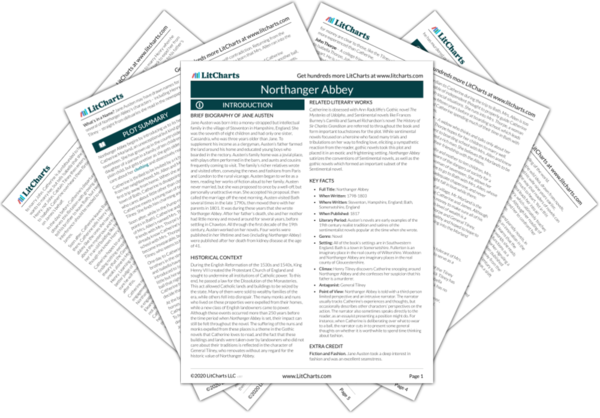Mrs. Morland Quotes in Northanger Abbey
When the hour of departure drew near, the maternal anxiety of Mrs. Morland will be naturally supposed to be most severe. A thousand alarming presentiments of evil to her beloved Catherine from this terrific separation must oppress her heart with sadness, and drown her in tears for the last day or two of their being together; and advice of the most important and applicable nature must of course flow from her wise lips in their parting conference in her closet. Cautions against the violence of such noblemen and baronets as delight in forcing young ladies away to some remote farm-house, must, at such a moment, relieve the fulness of her heart. Who would not think so? But Mrs. Morland knew so little of lords and baronets, that she entertained no notion of their general mischievousness, and was wholly unsuspicious of danger to her daughter from their machinations.

Unlock explanations and citation info for this and every other Northanger Abbey quote.
Plus so much more...
Get LitCharts A+Without suffering any romantic alarm, in the consideration of their daughter's long and lonely journey, Mr. and Mrs. Morland could not but feel that it might have been productive of much unpleasantness to her; that it was what they could never have voluntarily suffered; and that, in forcing her on such a measure, General Tilney had acted neither honourably nor feelingly—neither as a gentleman nor as a parent. Why he had done it, what could have provoked him to such a breach of hospitality, and so suddenly turned all his partial regard for their daughter into actual ill-will, was a matter which they were at least as far from divining as Catherine herself; but it did not oppress them by any means so long; and, after a due course of useless conjecture, that, “it was a strange business, and that he must be a very strange man,” grew enough for all their indignation and wonder; though Sarah indeed still indulged in the sweets of incomprehensibility, exclaiming and conjecturing with youthful ardor.

Mrs. Morland Quotes in Northanger Abbey
When the hour of departure drew near, the maternal anxiety of Mrs. Morland will be naturally supposed to be most severe. A thousand alarming presentiments of evil to her beloved Catherine from this terrific separation must oppress her heart with sadness, and drown her in tears for the last day or two of their being together; and advice of the most important and applicable nature must of course flow from her wise lips in their parting conference in her closet. Cautions against the violence of such noblemen and baronets as delight in forcing young ladies away to some remote farm-house, must, at such a moment, relieve the fulness of her heart. Who would not think so? But Mrs. Morland knew so little of lords and baronets, that she entertained no notion of their general mischievousness, and was wholly unsuspicious of danger to her daughter from their machinations.

Unlock explanations and citation info for this and every other Northanger Abbey quote.
Plus so much more...
Get LitCharts A+Without suffering any romantic alarm, in the consideration of their daughter's long and lonely journey, Mr. and Mrs. Morland could not but feel that it might have been productive of much unpleasantness to her; that it was what they could never have voluntarily suffered; and that, in forcing her on such a measure, General Tilney had acted neither honourably nor feelingly—neither as a gentleman nor as a parent. Why he had done it, what could have provoked him to such a breach of hospitality, and so suddenly turned all his partial regard for their daughter into actual ill-will, was a matter which they were at least as far from divining as Catherine herself; but it did not oppress them by any means so long; and, after a due course of useless conjecture, that, “it was a strange business, and that he must be a very strange man,” grew enough for all their indignation and wonder; though Sarah indeed still indulged in the sweets of incomprehensibility, exclaiming and conjecturing with youthful ardor.











